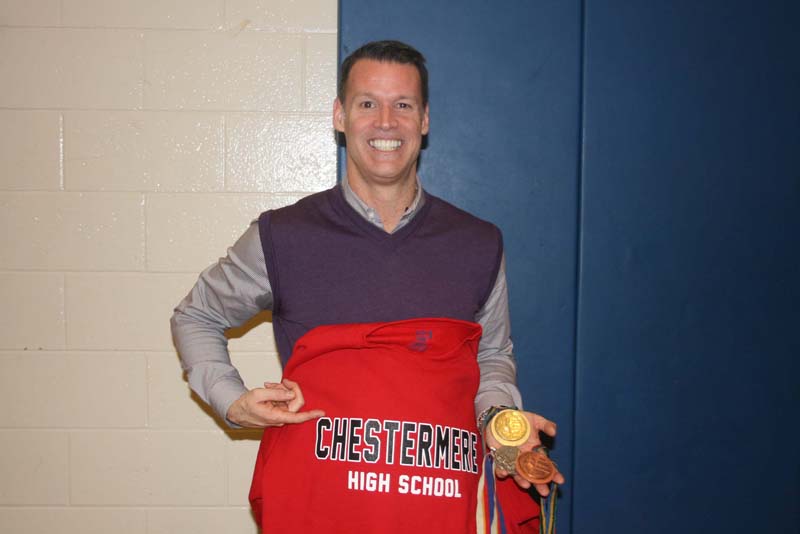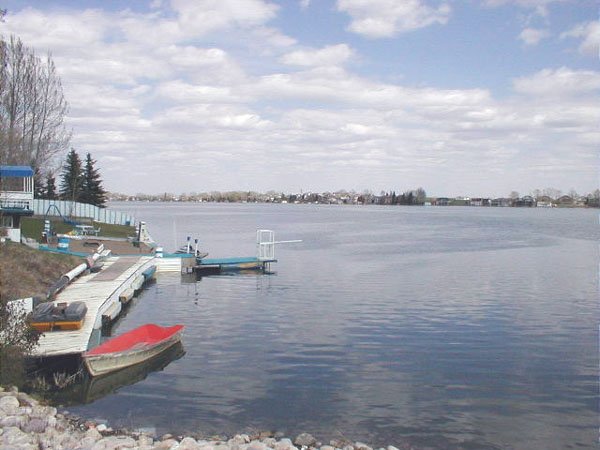
On February 27th, three time Olympic medalist, Mark Tewskbury, paid a visit to the Grade 10 students of Chestermere High School to tell his story of bullying and how he turned it into accomplishing his dreams.
Tewksbury, was born February 7, 1968 in Calgary, Alberta, trained at the University of Calgary before heading to the Canadian Olympic team as a swimmer. He competed at the 1988 Summer Olympics in Seoul and won a silver medal as part of Canada’s relay team. For some years he ranked as one of the top backstrokers in the world; never a strong below-the-water swimmer, he was unmatched on the surface, but, as the importance of below-the-water swimming increased, Tewksbury’s ranking began to fall.
Going into Barcelona, Tewksbury was ranked fourth in the world and most pundits picked one of the powerful American swimmers to win gold. Tewksbury’s gold medal was Canada’s first at the Barcelona games and the first Canadian gold in swimming since the Communist-boycotted 1984 Los Angeles Olympics. Tewksbury also won a bronze medal in the relay event in Barcelona. He made the cover of Time magazine. He was inducted into the Canadian Olympic Hall of Fame, the Canadian Sports Hall of Fame, and the International Swimming Hall of Fame and was named Canada’s Male Athlete of the Year. After the Barcelona games, Tewksbury retired from swimming. But before this brilliant athlete made his mark in the Olympic world, his story is one of bullying and being a social outcast.
Tewskbury began describing how watching the Montreal Olympics on TV. as a child was sort of the beginning of his goal to someday participate as an Olympic swimmer. He joined a swim club when he was 8 years old and he describes his childhood as “pretty uneventful” – going to school, swimming with his swim club – just a normal childhood. “And then things started to change. Around grade 6 and grade 7 – I had to move to a new school, I was the new kid in this school – which is always awkward – but I found my way. Despite not being that athletic, because I was in the swimming club, some of the more athletic people in the school sort of took me into their group and I felt pretty good. But then something very weird started to happen – I started to go through puberty. And as my buddies – the jocks – were starting to get attracted to girls, I was starting to get attracted to my buddies – it was the strangest thing. I turned out to be a gay person”.
Tewskbury went on to tell the students that discovering this back then was extremely difficult as he was very unsure of what ‘gay’ meant and even more so, what to do with these feelings and thoughts. So, as many young people did back then, and still some today, he did nothing. He kept it a secret and told no one.
“But it didn’t take long before some of those guys in my little circle of friends – the tough jock guys – started to sense that something wasn’t the same with me as we started to go through the school year. I remember showing up to school one day and the whispers started, I saw my group of friends whispering, turning to look at me and the back turning started. Suddenly my friends weren’t talking to me anymore and then I tried to make new friends with some of the people in the different groups and everyone just turned their backs. I would go to school every day feeling sick to my stomach about just trying to fit it, trying to find somebody to hang out with, try to sit down at lunch and not have people leave when I sat there. It was a really gross time”.
He goes on to explain that from there, things just got worse. As this young boy began to feel more and more alone, the really tough guys at his school began to see him as the easy target so he became the guy every day that would walk down the hall and get slammed into a locker, and he simply just kept walking, eyes down to just try and pretend that it hadn’t just happened. He reflects on another instance where one of the ‘tough jocks’ had decided that an after school fight should occur, for a reason that Mark still doesn’t know, but thankfully a teacher had caught wind of the impended school yard scrap and broke it up.
He continued going to school, hating it, dreading it knowing that every day would be the same. Until, what he calls ‘the worst thing happened’. “It was in May of my Grade 7 year. When I came to school and the lock on my locker was undone, and I knew something bad had happened. Somebody had broken in. And as I took the lock off – all across my locker was the word ‘fag’. F-A-G. On the door, on my binders, everywhere. I didn’t know what the word meant and at that time in life, no one talked about gay issues or being a lesbian or any of that stuff. No one had a vocabulary for it. I remember dying of embarrassment. Didn’t know what to do. So I skipped class, I went home and I was horrified in my bedroom when my parents came up later and said ‘what are you doing home?’. And I told them that something really bad happened at school today – and they asked what had happened. I was so embarrassed to say that word out loud to my mom and my dad and finally my mom said ‘whatever it is, it’s okay just tell us what happened’. So I said ‘this is what was written all over my books and my locker today’ and I could see the blood drain from my mom’s face as she read the word. I could tell immediately that it wasn’t ok. We went back to school the next day, and in this time no one knew how to deal with these sorts of issues – so the Principal suggested that I change schools”.
So the young student changed schools, and in three days, the knowledge of him being gay had followed him and the bullying continued. This bullying continued to follow the soon to be Olympic star through the rest of his schooling until the end of grade 12. But despite these horrific acts of others, Tewksbury clung to his love of swimming. At age 12 and 14 he was the best in Canada. Even though he was different and “odd”, he did feel an acceptance and respect from his swimming team mates – because after all, he was the best.
After high school, Mark swam with the University Dino’s swim team and then moved further in his swimming career and made the Canadian National Swimming team. It was during this time that he noticed that no one seem to mention, or care, that he was gay. He was a national champion and his excellence seem to be a deterrent to the negativity – they respected him. “Nobody said anything, except one guy. His name was Victor Davis. He was the toughest, angriest, most masculine guy you’ve ever met. Victor took one look at me and he said ‘you disgust me. You are a gay man and you make me sick’ and I looked at Victor, and I have to admit, I felt the exact same way. I told him he was the stereotypical jerk, you’re a big dumb jock, and you’re all the things that I hate too”. So they avoided each other, despite being on ‘Team’ Canada together, they avoided each other at all costs. They never spent time together, they didn’t speak to each other they simply did not exist to each other. Until they got to Tewksbury’s first Olympics.
“My first Olympics was in Seoul Korea. I was part of a team that had an amazing opportunity to win 9 medals. We had three world record holders on our team and after five days of competition, all of that potential turned into zero medals. Why? Because ‘Team’ Canada – instead of working with each other, supporting each other – they competed against each other. The last day of competition, we’re at the Olympics, we have zero medals so far. But in my race the day before, 100 metre backstroke, I came in 5th, I had earned the spot to swim in the relay the next day. I swam the back stroke and who do I have to pass off to? The breaststroker, Victor Davis. We made the final, without Victor and I talking to each other, then we had to wait 8 hours before we went back to swim that final in the evening. About three hours before the race, I was very standoffish, because I didn’t want to go anywhere near Victor because that was our history. I’ll never forget it. Victor came up to me and he actually approached me and he put his arm around me. Victor pointed in my chest and said ‘Tewskbury, what did you dream of when you were a kid?’ and I answered ‘I dreamt of winning a medal but that didn’t’ happen did it?’ Victor replied, ‘well you better wake up because those two guys and me want a medal more than anything and I have to say something to you. I’ve been such a jerk to you for so long – I have to apologize because guess what, I need you’. “. They went on to win the Silver medal and as Mark explains, just as magical as winning that medal was, finally building a friendship with Davis and having that acceptance was just as magical. They remained very close friends in the months following that Olympics, but sadly, ten months after their Silver medal swim, Davis was brutally ran down in a street in Montreal and killed.
Tewksbury went on to tell the students of his second and third Olympic victories – Gold in Los Angeles and Bronze in Barcelona. After retirement, Tewksbury received a number of high-profile endorsement deals and worked as an athlete representative with the IOC, a position from which he resigned in disenchantment in 1998, accusing the IOC of corruption. He was also part of the group of former Olympic athletes that was pushing for the resignation of IOC President Juan Antonio Samaranch. Tewksbury became a prominent advocate for gay rights and gay causes in Canada and the world. On May 16, 2003, Tewksbury joined the board of directors for the 2006 World Outgames in Montreal and was named co-president. He was a panelist at the 2003 National Gay and Lesbian Athletics Conference in Cambridge, Massachusetts, on a panel of LGBT Olympians that also included rower Harriet Metcalf and high jumper Brian Marshall. On September 19, 2009 Tewksbury was inducted into Canada’s LGBT Human Rights Hall of Fame, the Q Hall of Fame Canada, in honour of his outstanding achievements and efforts to end discrimination in the sports world and on August 5, 2010, he was named the chef de mission of the 2012 Canadian Summer Olympic team.
Tewksbury left the students with the message of just how the Canadian Olympic Team had learned to accept each other and to work as a ‘team’, it is up to the students and those in the community to decide if they are going to work together as a team or to compete against each other. “Take care of each other, show a little compassion, and make the effort”.







